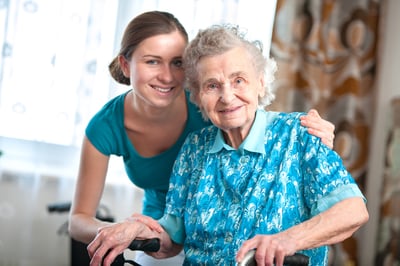 While peri-care can initially be intimidating, it is a very important part of the private caregiver/patient relationship. Let's take a closer look at the importance of perineal care, as well as how to perform this critical duty to ensure the ongoing health of your loved one.
While peri-care can initially be intimidating, it is a very important part of the private caregiver/patient relationship. Let's take a closer look at the importance of perineal care, as well as how to perform this critical duty to ensure the ongoing health of your loved one.
Why is Peri-care Important?
Peri-care—also known as perineal care—involves cleaning the private areas of a patient. Because this area is prone to infection, it must be cleaned at least daily, and more if your loved one suffers from incontinence. Typical times to perform peri-care include as part of daily bathing, after the use of the bedpan, and following episodes of incontinence.
Regular peri-care can not only minimize odors, it can also can help prevent urinary tract, bladder and kidney infections.
The Basics of Performing Peri-care (Video)
Thoroughly wash your hands and don gloves before beginning your peri-care regimen.
When your hands are clean and you're ready to start, ask your patient to separate his/her legs. If patients are unable, caregivers will need to offer gentle help. Keep your loved one's body covered to prevent unnecessary exposure and help promote a sense of dignity.
One of the most important aspects of peri-care is checking for signs of infection. These include swelling, lesions, rashes, sores, and boils. These symptoms can lead to serious conditions if not recognized and treated. If you do notice these warning signs, contact your loved one's health care provider.
The video below provides a step-by-step demonstration for caregivers on how to administer peri-care, including gathering supplies, ensuring privacy, and providing thorough care with both compassion and dignity.
Step by Step
Moving from front to back, use warm water and a clean washcloth (or disposable wipes) to clean the perineal area. For females, this involves cleaning the inner legs, labia, and groin area while for men it requires cleaning the tip and shaft of the penis, along with the scrotum. Both men and women require cleaning of the anal area, which will involve turning the patient on his/her side.
If possible, use a fresh wipe for each "swipe". If using a washcloth, use a clean area of the cloth for each motion, and never move from back to front as this can spread germs and cause urinary tract infection. Have several washcloths handy just in case you need more than one.
If your loved one has a foley catheter, wipe around and down the tubing, but avoid tugging on the foley as this can be painful and harmful.
When you are finished and the entire perineal area is clean, make sure to thoroughly dry each area as excess moisture can lead to chapping and bed sores. Moisturizers and creams can help protect this delicate area. Always be gentle, as this area of the body is sensitive.
Occasionally bed linens will become soiled during perineal care. If so, remove them and launder them along with the washcloth. A waterproof pad placed under the buttocks, meanwhile, can be a moisture barrier between your loved one and the bed linens.
Remember: the more comfortable you feel with this task, the more comfortable your loved one will feel. Conversely, if you treat peri-care awkwardly or with disdain, your loved one's discomfort will be amplified. Maintain a pleasant demeanor, and be sure to explain what you're doing every step of the way.
Final Thoughts
While perineal care may not top the list of your favorite caregiver tasks, the establishment of a regular peri-care routine is critical to the ongoing well-being of your aging loved one. If you found this article helpful, please share it with fellow caregivers to help keep seniors safe and healthy. Also, be sure to check out mmLearn.org's step-by-step instructional video on providing proper peri-care, along with their complete collection of videos for caregivers.
If you're looking for a comprehensive resource for family caregivers, check out our online Family Caregiver Guide.
mmlearn.org offers a large library of free videos for caregivers of older adults, covering topics pertaining to senior care. Whether you are a healthcare professional or a family caregiver, if you are caring for an older adult we know that you will find mmlearn.org an essential learning and guidance tool for all of your caregiver training needs. 
